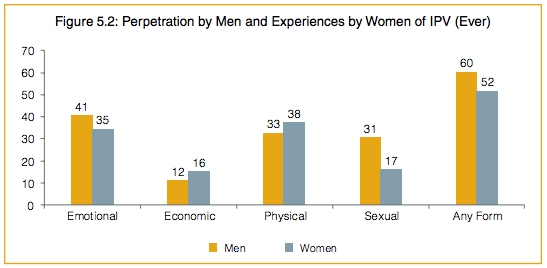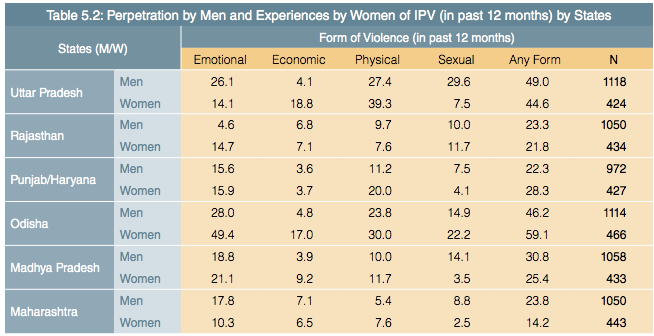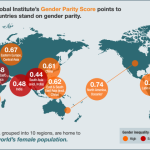Domestic violence continues to be one of the most incessant and relentless hardships women face in India. Domestic violence is not going to be so easy to get rid of, especially when the majority of men and women in India find domestic violence justifiable most of the time. A terrifying report by the International Center for Research on Women (ICRW) and the UNFPA, on masculinity and Intimate partner violence, found that men and women don’t all see domestic violence, or men’s control over their wives/partner, as a condemnable or criminal act. On the contrary, sometimes it’s necessary, and normalized.


Let’s review:
- First- it was revealed that 52% of female respondents reported being subjected to some form of violence through their lives, while 60% of men admitted to having committed various acts of violence on women.
- The study revealed that while 93.6% of male respondents believed that a woman should obey her husband, and that 76.9% of the men – and 78.7% of the women – believed that if a wife or partner does something wrong, a man has the right to punish her.
- 51.1% of the male respondents and 57.3% of the female respondents believed that a woman should tolerate domestic violence to keep her family together.
- Of the 52% of women who admitted to being victims of violence, 38% reported to be victims of physical violence, 35% admitted to being emotionally violated while 17% reported sexual violence. Of this, 3/4th of the respondents from Odisha and Uttar Pradesh (75%) admitted to perpetrating varied forms of violence.


Furthermore, although marital rape is not criminalized in India, the study did not omit sexual assault in its research questions on intimate partner violence (IPV). The findings are baffling again, but sadly, not all that surprising. The majority of women interviewed (62%) said ‘yes’ when asked if a man should ‘expect wife/partner to agree when they (men) want to have sex’ and that the ‘husbands/partners don’t approve wife/partner suggesting the use of condoms’. 77% women also said that their partners expected them to agree when they wanted sex. And, 74.6% of men and 65.1% of the women believed that if a woman does not physically fight back, it is not rape.
Interestingly, the findings show that childhood experiences of discrimination have a strong bearing on attitudes of masculinity and control. Economic stress was also one of the reasons behind violent behaviour; so were alcohol or substance abuse, poverty, women’s power and relationship-conflict. Results showed that education is an important variable and predictor and therefore an important target to end violence by intimate partners.
I would like to note that these numbers and findings from 2014 aren’t far from the 1997-2000 study by ICRW 15 years back on IPV in India, then also about half the respondents believed in justifiable acts of violence on their partners.
These numbers are shocking on one hand, and the other they’re not that surprising either. I can already hear the argument that says “see- women perpetuate violence, and that they’re as much to blame, and really when women will be empowered educated and independent, IPV will stop”. That isn’t false, and I’m not saying education and empowerment levels don’t have a significant role to play, but this argument needs to be nuanced, a lot. It isn’t surprising that victims believe the violence they’re experiencing was justified. Perpetrators of that violence, especially intimate partners, have done everything in their power to make their victims believe it, they’ve used every trick in the book to shift the blame onto their victims. Whether it’s belittling, humiliating their victims because they haven’t made the food on time, or stayed quiet when they had to, or using patriarchal norms as excuses, such as going out of the house without permission. Victims’ self esteem has been so twisted and battered that they internalize the narratives that have permitted such violence, and end up protecting those who have hurt them.
It isn’t surprising in this hostile climate towards women, and sexist narratives that justification is the norm, and punishment of victims is too. It’s Indian society’s leniency and acceptance- by men and women- towards violence against women in the home and within marriage that permits for such justifications of violent acts.
It is our job to rectify this- pull away from victim blaming- they’re blamed enough. It is our job to remember being violent is a decision, a decision violent partners take willfully and consciously. The numbers and the profile of women who experienced IPV show that assailants prey on vulnerability, such as lack of agency- education- financial dependence etc. What vulnerability means changes across class, race, and regions but the numbers show perpetrators find where it hurts and hit hard smack dab in the middle.
These numbers are important and are very telling. Again it seems educating men and boys on gender equality, by tackling masculinity and redefining it, empowering and educating girls, coupled with a strong protective legal and judicial system for women, are the primary targets to fight back against IPV.
Donation for Centre for Social Research to Join our effort in rehabilitating Domestic Violence
Discuss this article on Facebook





